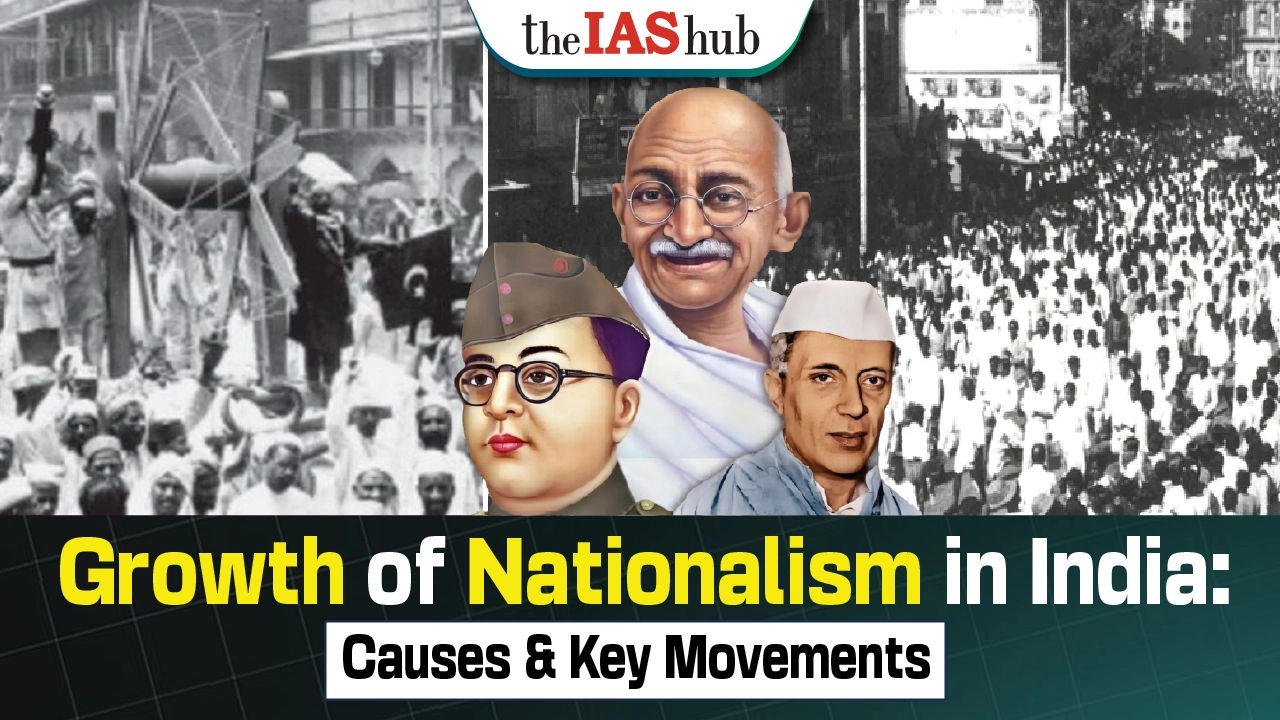Explore the growth of nationalism in 19th-century India—political, economic, social, and cultural factors that fueled the freedom movement. Learn about key leaders, organizations, and phases that shaped Indian nationalism.


The growth of nationalism in India during the 19th and early 20th centuries was a multifaceted process shaped by political, economic, social, and cultural factors. It emerged both as a response to colonial exploitation and as an assertion of India’s national identity. The spread of Western education, press, and modern infrastructure played a pivotal role in mobilizing public opinion. Additionally, reactionary British policies and pre-congress political organizations laid the foundation for a united national movement.
Nationalism emerged in 19th-century British India both in emulation of and as a reaction against the consolidation of British rule and the spread of Western civilization.
Before the formation of the Indian National Congress (INC) in 1885, several organizations and movements emerged in India that laid the foundation for the nationalist movement.
Initiated by Allan Octavian Hume on December 28, 1885, the INC emerged as the first organized political platform that aimed to unite the diverse voices and aspirations of Indians under one banner.


|
Interesting Facts: Bal Gangadhar Tilak gave slogan: "Freedom is our birthright, and we must have it." |
|
Basis |
Moderates |
Extremists |
|
Phase |
1885-1905 |
1905-1920 |
|
Aim |
1. Aimed at administrative and constitutional reforms. 2. Wanted greater autonomy and self-rule while still under the nominal rule of the British crown. 3. They were secular in their attitudes. |
1. Aim of getting Swaraj 2. Wanted to end the tyranny rule of British. |
|
Ideology |
1. Believed in the efficacy of constitutional agitation. 2. Had great faith in the British sense of justice and fair play. 3. They imbibed western ideas of liberalism, democracy, equity and freedom. |
1. Radical in their approach. 2. Ideological inspiration was Indian History, Cultural heritage,etc. Hence, they revived the Ganapati and Shivaji festivals. |
|
Methodology |
1. They follow the principles of 3P: Petition, Prayer and Protest. 2. They believed in cooperation and reconciliation. |
1.Guided by 4 principles Swarajya, Swadeshi, Boycott of foreign goods and National education to make Indians aware. 2. Believed in atmashakti as a weapon against domination. |
|
Social support |
Zamindars and Upper middle classes in towns. |
Educated middle and lower middle classes in towns. |
|
Leaders |
Surendra Nath Banerjee, Dadabhai Naoroji, Gopalakrishna Gokhale |
Lala Lajpat Rai, Lokmanya Bal Gangadhar Tilak. Bipin Chandra Pal, Aurobindo Ghose |
|
Contribution |
1. Economic Critique of British Imperialism 2. Constitutional Reforms and Propaganda in Legislature 3. Campaign for General Administrative Reforms 4. Defence of Civil Rights |
1. Demand of Swaraj 2. Mass movement 3. Spread of national education 4. Upliftment of downtrodden 5. Nationalism 6. Support to revolutionary movements |
|
Some Important Personalities associated with Lower Class Movements: 
|


Refine your answer writing skills and elevate your UPSC preparation with personalized support and expert feedback.
Fill out the form to get started with the program or any other enquiries !








Are you dreaming of becoming an IAS officer? Then, IAShub can be your best guide. It is one of the Best IAS Coaching in Delhi. Many students who want to clear the UPSC exam join IAShub for learning. The institute gives both online and offline classes. Their teachers are experienced and helpful. They easily explain every topic. Students also get notes, tests, and tips to do well in the exam.
IAShub is in Delhi and is trusted by many UPSC students. It offers coaching for every part of the UPSC exam – Prelims, Mains, and Interview. The classes are simple and easy to understand. The teachers are experts and guide students in the right way. IAShub is also known for its helpful notes, test series, and answer-writing practice. IAShub is the best coaching in Delhi and also gives UPSC Online Classes. This helps students from any place in India to learn. The online classes are live and also recorded. So, students can watch them anytime. These classes cover the full UPSC syllabus.
Here are some important services provided by IAShub:
The UPSC Civil Services Exam has three parts:
This exam is tough, but with the right guidance, it becomes easy to manage. Students must study smart and stay regular.
IAShub supports students from the beginning to the end. It gives the right books, tests, and notes. The classes are easy to follow, and the teachers are always ready to help. Students get personal doubt sessions too. The test series and answer checking help students learn where they need to do better. Also, free study materials save time and money.
IAShub also guides students during the final stage – the interview. Experts take mock interviews and give useful tips. This full support makes IAShub one of the best IAS coaching in Delhi.